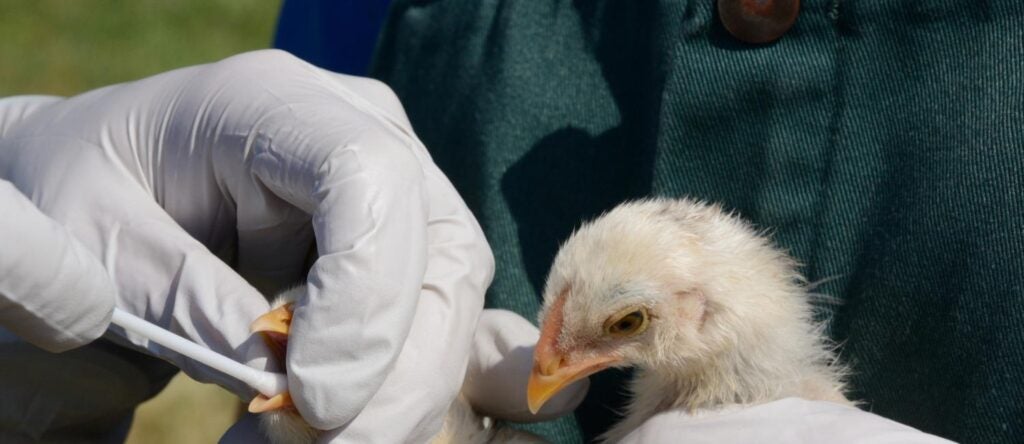Seven Penn Vet Researchers Receive COVID-19 Pilot Awards
Faculty In This Story
Seven researchers from the School of Veterinary Medicine at the University of Pennsylvania (Penn Vet) have been selected to receive distinctive COVID-19 Pilot Awards from the Penn Vet COVID Research Innovation Fund. The Fund, provided with critical start-up support through a generous gift from Vernon and Shirley Hill, will bolster Penn Vet’s rapidly expanding research and response program to fight the novel coronavirus.
Studies funded demonstrate Penn Vet’s unique and collective expertise in pathogen-related research, infectious disease, and translational medicine to fight the COVID-19 pandemic.
“Penn Vet’s COVID-19 Pilot Awards are supporting our research laboratories in making significant strides toward solving this public health emergency,” said Phillip Scott, PhD, Vice Dean for Research and Academic Resources. “These awardee investigators will categorically advance our understanding of the basic science of the SARS-CoV-2 respiratory virus. Their findings will not only enhance the treatment and prevention of COVID-19, but lead us to an understanding of other novel respiratory viruses.”
The 2020 Penn Vet COVID-19 Pilot Award recipients are:
Montserrat C Anguera, PhD, Associate Professor, and Andrew E. Vaughan, PhD, Assistant Professor, both Department of Biomedical Sciences, “Investigation of the Genetic and Hormonal Contributions for Male-biased COVID-19 Disease.”
Ronald N. Harty, PhD, Professor of Pathobiology and Microbiology, Department of Pathobiology, “SARS-CoV-2 Virus-Host Interactions and Therapeutic Intervention.”
De’Broski R. Herbert, PhD, Associate Professor, Department of Pathobiology, “Cross-species SARS-CoV-2 Transmission.”
Christopher A. Hunter, PhD, Mindy Halikman Heyer Distinguished Professor of Pathobiology, Department of Pathobiology, “The Role of IL-27 in Limiting the Development of Cytokine Storms.”
Elizabeth M. Lennon, DVM, PhD, Pamela Cole Assistant Professor of Internal Medicine, Department of Clinical Sciences and Advanced Medicine, “SARS-CoV-2: Role of Housecats as a Reservoir for Human Infection.”
Michael J. May, MSc, PhD, Associate Professor, Department of Biomedical Sciences, “Targeting Lymphatic Endothelial IKKa: A Novel Therapeutic Strategy for Treatment of COVID-19.”
Ellen Puré, PhD, Grace Lansing Lambert Professor of Biomedical Science; Chair, Department of Biomedical Sciences, “Defining the Cellular and Molecular Basis of the Fibro-inflammatory Response to SARS-CoV2 Infection.”
In addition to the Pilot Awards, Penn Vet’s COVID-19 Research Innovation Fund is also supporting the Working Dog Center’s COVID-19 canine scent detection study. Announced on April 28th, the pilot training program is utilizing scent detection dogs in a laboratory setting to discriminate between saliva and urine samples from COVID-19 positive and COVID-19 negative patients.
Related News

What’s That? Black squirrels. (link is external)
This is …A common question on campus tours is about uncommon residents, the black squirrels. They live …The black squirrels are regularly seen on College Green, scampering between the historic…

What to know about the current avian influenza outbreak (link is external)
Louise Moncla and Aliza Simeone of Penn Vet and Kathleen Hall Jamieson of the Annenberg Public Policy Center share helpful information for the public.

University of Pennsylvania’s School of Veterinary Medicine Leading Collaborative Effort Against Highly Pathogenic Avian Influenza
Since 2022, highly pathogenic avian influenza (HPAI) has rapidly spread throughout the Americas and poses ongoing risks to wildlife, livestock, and human health. The current outbreak is notable for infecting…
About Penn Vet
Ranked among the top ten veterinary schools worldwide, the University of Pennsylvania School of Veterinary Medicine (Penn Vet) is a global leader in veterinary education, research, and clinical care. Founded in 1884, Penn Vet is the first veterinary school developed in association with a medical school. The school is a proud member of the One Health initiative, linking human, animal, and environmental health.
Penn Vet serves a diverse population of animals at its two campuses, which include extensive diagnostic and research laboratories. Ryan Hospital in Philadelphia provides care for dogs, cats, and other domestic/companion animals, handling more than 30,000 patient visits a year. New Bolton Center, Penn Vet’s large-animal hospital on nearly 700 acres in rural Kennett Square, PA, cares for horses and livestock/farm animals. The hospital handles more than 6,300 patient visits a year, while our Field Services have gone out on more than 5,500 farm service calls, treating some 22,400 patients at local farms. In addition, New Bolton Center’s campus includes a swine center, working dairy, and poultry unit that provide valuable research for the agriculture industry.






